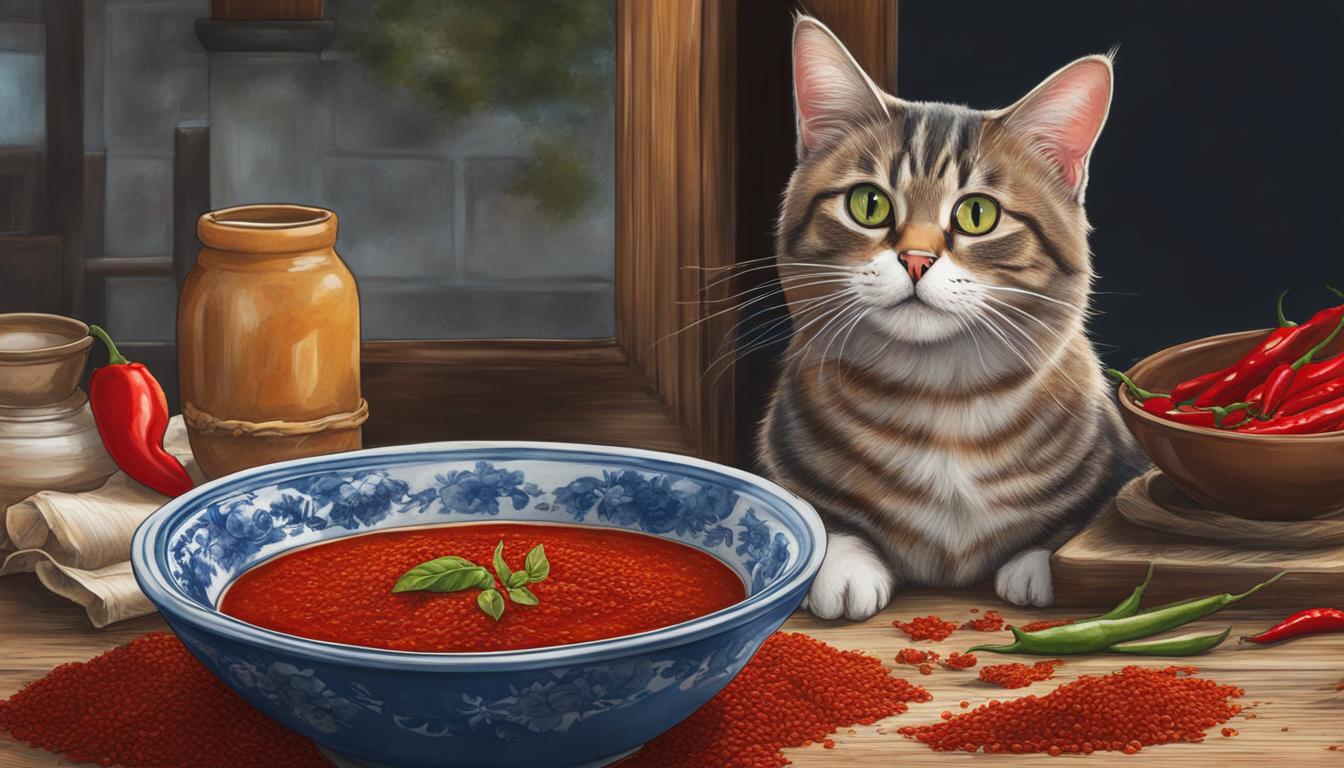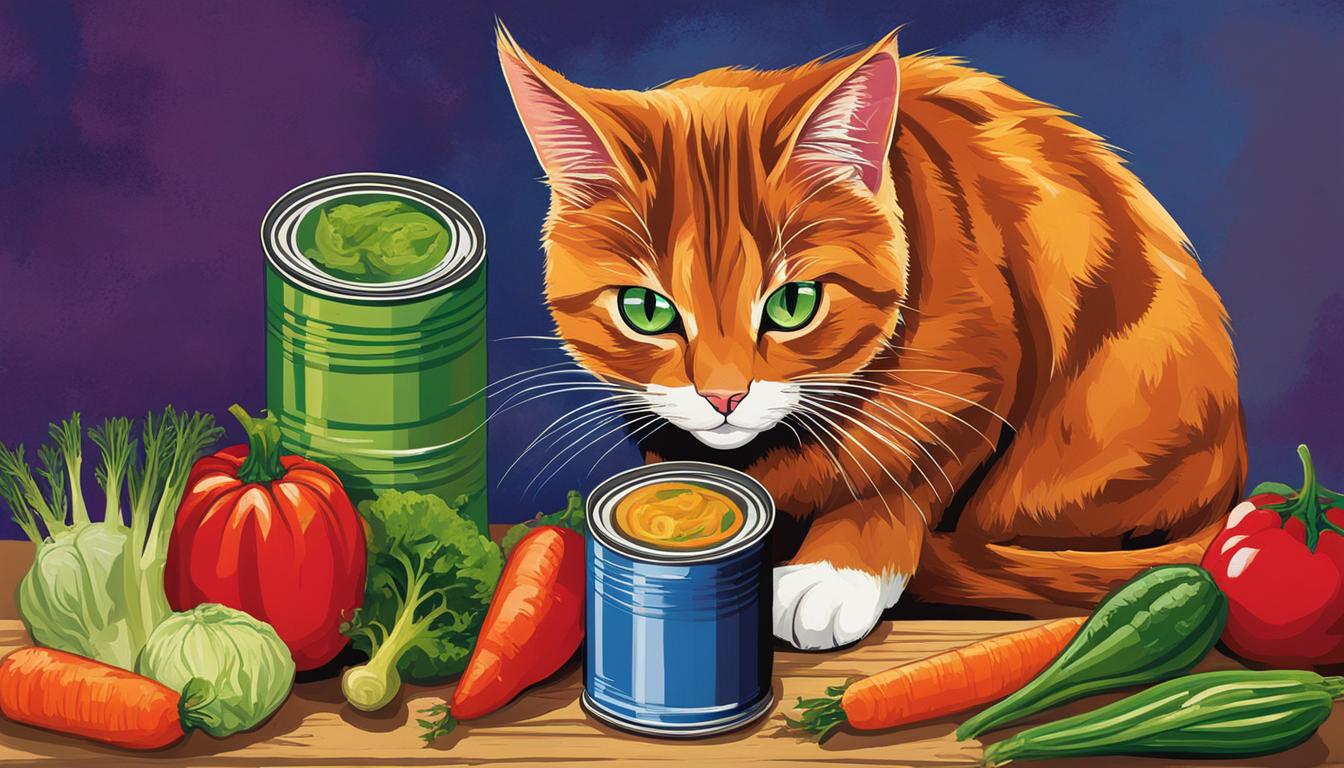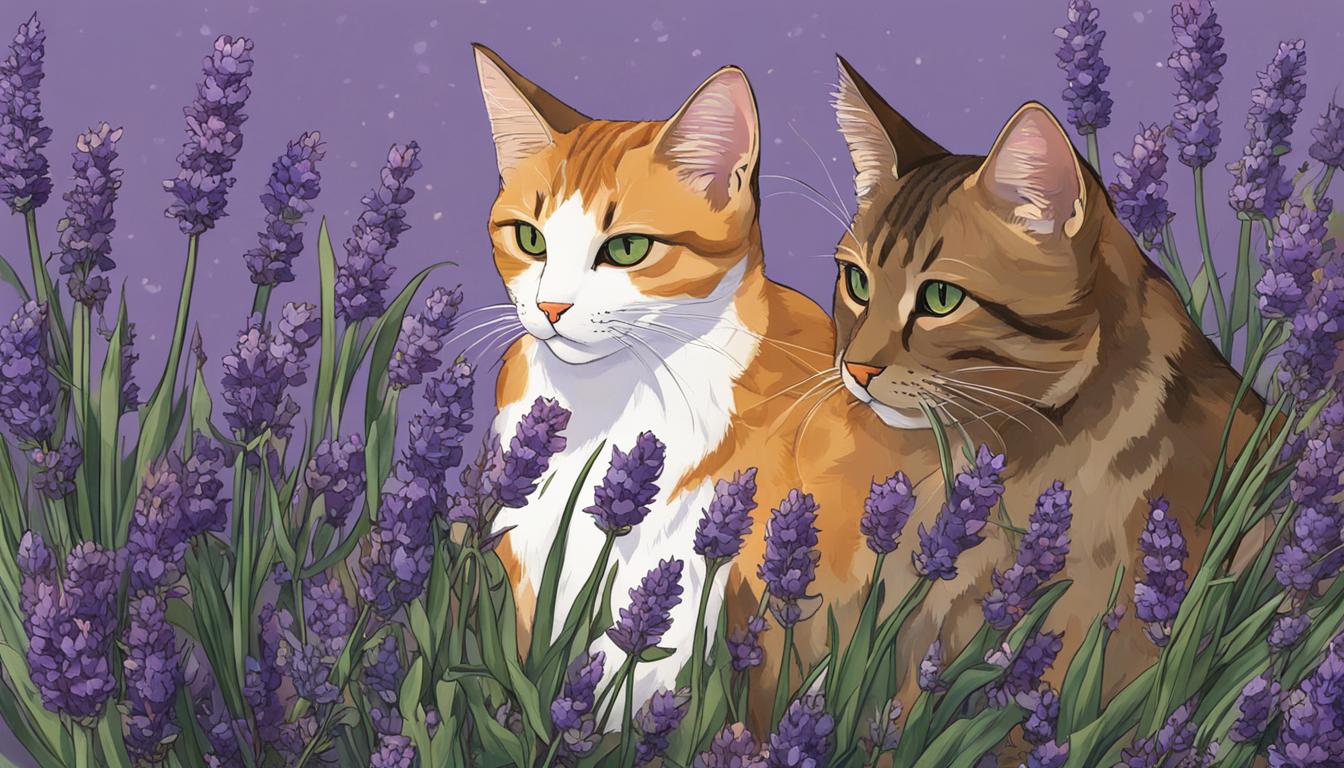As a curious cat lover, I’ve often wondered if cats can handle the heat of spicy foods like chili. Does their taste buds tingle with delight or do they regret their brave decision? It’s time to find out if cats can handle the spice and explore the feline reaction to hot peppers.
Before you reach for that bottle of hot sauce to share with your feline friend, it’s important to understand that spicy foods are not suitable for cats. While we may enjoy the fiery sensation, our furry companions don’t share the same enthusiasm. Here’s why:
Key Takeaways:
- Cats should not eat chili or any spicy food as it can cause stomach troubles and discomfort.
- Spicy foods may contain toxic ingredients like onions and garlic, which can harm a cat’s digestive system.
- Cats are not naturally inclined to enjoy spicy flavors and may be drawn to the smell, texture, or warmth of spicy food.
- Safe treat alternatives for cats include steamed vegetables, cooked eggs, and canned cat foods with unique flavors.
- Feeding cats spicy food can lead to digestive issues, discomfort, and potential health risks.
Why Spicy Food is Not Good for Cats
When it comes to cats and spicy food, it’s important to understand why these two don’t mix well. The primary component of spicy food, capsaicin, can have adverse effects on feline health. Cats are known for their sensitive stomachs, and capsaicin can cause stomach troubles such as vomiting and diarrhea. It can also lead to other discomforting symptoms like watery eyes and a runny nose. Giving spicy food to cats can result in digestive issues that can leave them feeling miserable.
But that’s not the only reason why spicy food is a bad idea for cats. Spicy foods, including chili peppers and jalapeños, often contain other ingredients that can be toxic to cats. Onions and garlic, for example, are commonly found in spicy dishes and can be harmful to a cat’s digestive system. These ingredients can even damage a cat’s red blood cells and lead to anemia. Additionally, spicy food can be high in fat content, which is not healthy for cats. Feeding them spicy food can put their overall well-being at risk.
While cats may seem interested in spicy food, it’s important to remember that they don’t actually enjoy the taste. Cats are not naturally inclined to seek out spicy flavors. As mammals, humans and tree shrews are the only ones known to have a preference for spicy food. Cats may be drawn to the smell or texture of spicy food, but their sensitivity to spicy flavors can cause them discomfort and pain. They may beg for a taste, but it’s best to provide them with safe alternatives instead.
| Effect of Capsaicin on Cats | Spicy Food Toxicity in Cats |
|---|---|
| Causes stomach troubles | Can lead to vomiting and diarrhea |
| Can result in discomforting symptoms like watery eyes and a runny nose | Contains toxic ingredients such as onions and garlic |
| High fat content, unhealthy for cats | Can damage a cat’s red blood cells and lead to anemia |
| Cats are not naturally inclined to enjoy spicy flavors | Can cause cats discomfort and pain |
The Sensitivity of Cats to Spicy Flavors
When it comes to spicy flavors, cats are a bit different from humans. While some of us may enjoy the burn of a hot sauce or the kick of jalapeños, cats have a completely different reaction. In fact, cats are not naturally inclined to enjoy spicy flavors at all. It turns out that humans and tree shrews are the only mammals known to seek out spicy foods.
So why do cats sometimes show interest in spicy food? Well, it’s not because they enjoy the taste. Cats may be drawn to the unique smell or texture of spicy food, but they do not actually find it appealing. It’s important to keep in mind that cats have a highly sensitive sense of taste, and what may seem mild to us can be extremely overwhelming for them. The spiciness of peppers, for example, can cause discomfort and even pain for cats.
Another reason why cats may be drawn to spicy flavors is their preference for warm food. Cats are known to enjoy warm food because it reminds them of freshly caught prey. Spicy foods are often served warm, and this temperature can be enticing to cats. However, the sensitivity of cats to spicy flavors can cause them digestive issues and discomfort, making it crucial to avoid feeding them spicy food altogether.
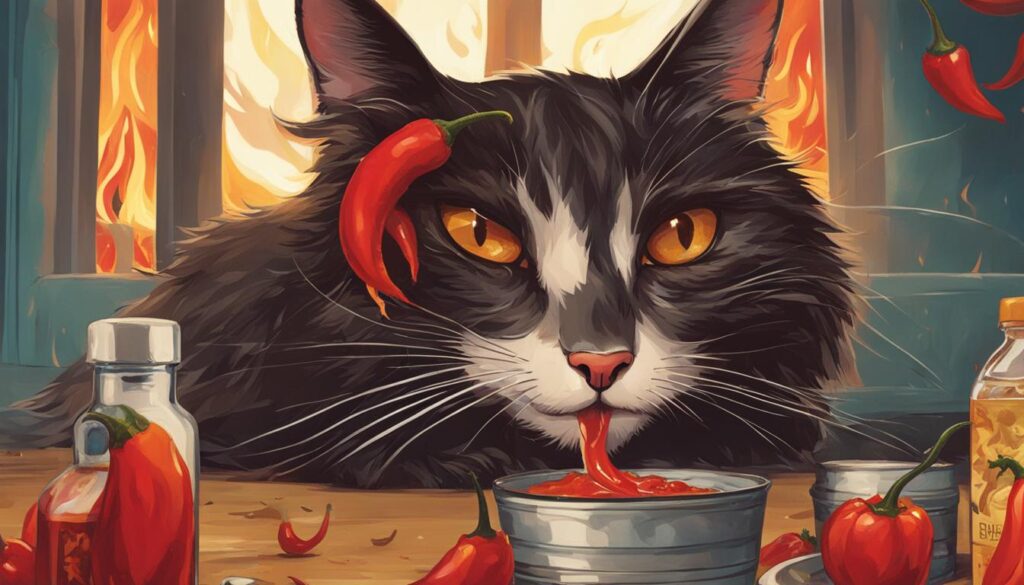
The Curious Case of Cats and Hot Sauce
“I once made the mistake of leaving a bottle of hot sauce unattended on the kitchen counter. My cat, Whiskers, couldn’t resist the intriguing smell and decided to investigate. The moment she licked a tiny drop of the sauce, she was in for a shock. Whiskers quickly realized that spicy flavors were not her cup of tea and spent the rest of the day licking her lips and pawing at her mouth, trying to get rid of the burning sensation. It was a lesson learned for both of us!” – Cat owner
Safe Treat Options for Cats
When it comes to treating your beloved feline companion, it’s important to prioritize their health and wellbeing. Instead of indulging their curiosity for spicy food, there are plenty of safe alternatives that will keep them happy and satisfied. Here are some options to consider:
- Steamed Carrots: Carrots are not only low in calories but also rich in vitamins and minerals. Steaming them makes them softer and easier for cats to chew.
- Asparagus: Asparagus is a great source of fiber and nutrients for cats. However, it’s important to remove the woody parts and only offer the tender tips.
- Squash: Cooked squash, such as butternut or acorn squash, can be a tasty treat for cats. It provides vitamins A and C, as well as dietary fiber.
- Cooked Eggs: Eggs are a good source of protein for cats. Make sure they are fully cooked before offering them as a treat.
- Avocado: While avocados are safe for cats to eat in small amounts, it’s important to remove the skin and pit, as they can be toxic. Offer small pieces as an occasional treat.
Additionally, there are specially formulated canned cat foods available that offer a variety of unique flavors. These can provide a safe alternative to satisfy your cat’s cravings. Look for options such as chicken, duck, sardine, shrimp, crab, or tuna and crab varieties.
Remember, moderation is key when it comes to offering treats to your cat. It’s always a good idea to consult with your veterinarian before introducing new foods into your cat’s diet to ensure they are safe and appropriate for your furry friend.
By providing your cat with safe and nutritious treat options, you can keep them happy and healthy while avoiding the potential risks associated with spicy foods. So next time you’re in the kitchen, whip up a treat that will truly delight your feline companion!
The Inadvisability of Feeding Cats Spicy Food
As a professional cat owner and enthusiast, I strongly advise against feeding cats spicy food. While it may be tempting to share a taste of your favorite jalapeño dish with your feline friend, it can lead to some unpleasant consequences. Cats, unlike humans, do not possess a natural tolerance for spicy flavors, and consuming spicy food can cause digestive issues, discomfort, and even toxicity in severe cases. So, even if your cat seems curious about that plate of hot wings, it’s best to keep it out of their reach.
Spicy food can irritate a cat’s stomach and intestines, leading to vomiting, diarrhea, and bloating. The primary compound responsible for the heat in spicy food, capsaicin, can be particularly troublesome for cats. Moreover, many spicy foods, including jalapeños, contain other ingredients like onions and garlic, which can be toxic to cats. These ingredients can damage a cat’s red blood cells and lead to anemia. It’s essential to prioritize your cat’s health and well-being by steering clear of spicy food altogether.
“Even though cats may be enticed by the smell and presence of spicy food, it’s important to exercise caution and not allow them to consume it.”
Instead of risking your cat’s health with spicy food, there are plenty of safe treat options available. Consider offering them a variety of healthy human foods in moderation, such as steamed carrots, cooked eggs, or even a small amount of avocado. Additionally, there are canned cat foods with unique flavors, like chicken, duck, sardine, shrimp, and crab, or tuna and crab. These options provide a delicious alternative without the risks associated with spicy food.
| Treat Options | Description |
|---|---|
| Steamed Carrots | A healthy and nutritious snack for cats, rich in vitamins and fiber. |
| Cooked Eggs | A protein-packed treat that can be enjoyed by cats in moderation. |
| Avocado | A small amount of ripe avocado can provide healthy fats for cats, but should be given sparingly due to its high calorie content. |
| Canned Cat Foods | Choose options with unique flavors like chicken, duck, sardine, shrimp, and crab, or tuna and crab, to offer your cat a tasty and safe alternative. |
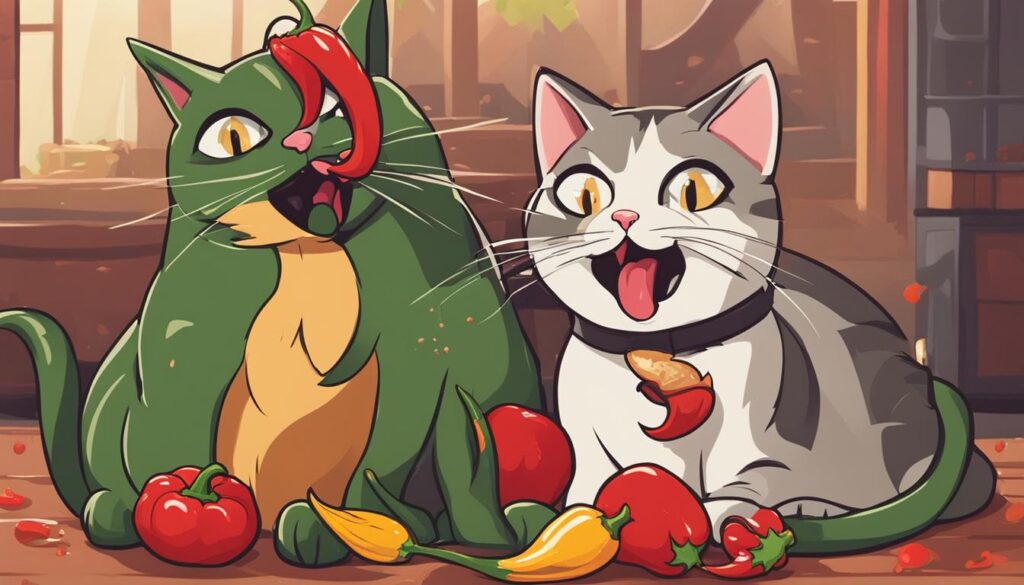
While it may be amusing to watch a cat’s reaction to spicy food, it’s crucial to prioritize their health and avoid potential risks. By providing your furry friend with safe and appropriate treats, you can ensure they enjoy a well-balanced and satisfying diet. Remember, a happy and healthy cat is the best reward!
The Risks of Giving Cats Chili
Chili should be avoided when it comes to feeding cats. Its spicy nature can cause digestive distress, including vomiting, diarrhea, and bloating. The capsaicin found in chili can irritate a cat’s stomach and intestines. Additionally, chili can contain toxic ingredients like onions and garlic, which can damage a cat’s red blood cells and lead to anemia. It is crucial to keep chili and other spicy foods out of a cat’s reach to prevent potential health risks.
As a responsible cat owner, it is essential to be aware of the potential risks associated with feeding cats spicy food. Spicy food toxicity in cats can result in various uncomfortable symptoms and even lead to serious health complications. Cats are not able to metabolize capsaicin effectively, making them highly sensitive to its effects. The feline reaction to hot peppers can range from mild discomfort to severe gastrointestinal issues, depending on the quantity consumed.
Feeding cats chili exposes them to the risk of developing an upset stomach, along with vomiting and diarrhea. The spicy nature of chili peppers can cause inflammation and irritation in a cat’s digestive system, leading to gastrointestinal distress. Additionally, the presence of toxic ingredients like onions and garlic in chili can further exacerbate these issues. Onions and garlic contain compounds that can be toxic to cats, potentially causing damage to their red blood cells and leading to anemia.
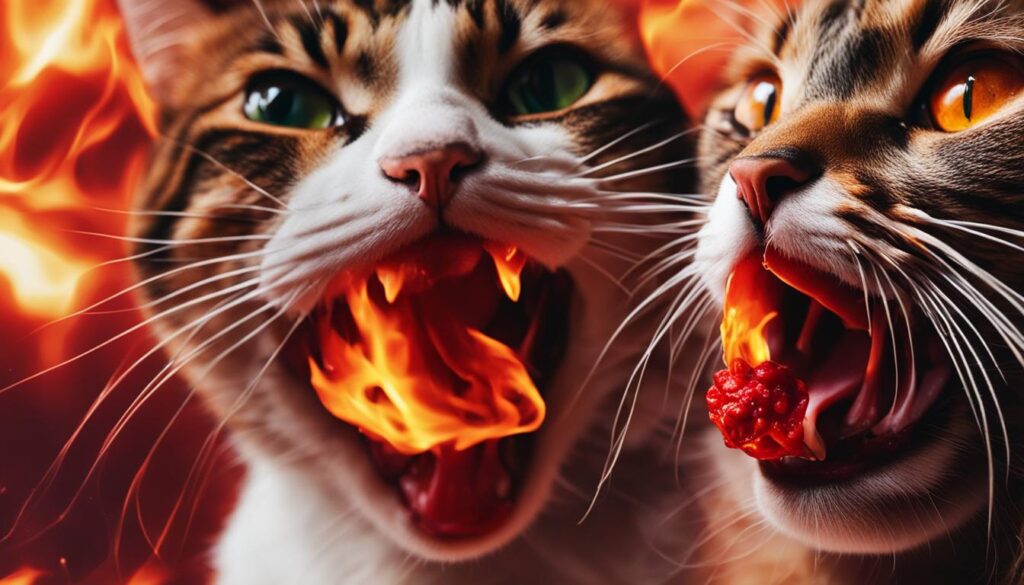
It is important to understand that cats are not able to tolerate spicy flavors like humans do. While we may enjoy the heat and sensation of spicy food, cats lack the necessary taste receptors to appreciate these flavors. Their natural preference is for warm food that reminds them of prey. Consequently, offering cats safe alternatives to spicy food is crucial for their overall well-being.
Providing cats with a balanced and nutritious diet is key to their health and happiness. Instead of giving cats chili or other spicy foods, it is advisable to offer them a variety of safe treat options. Some examples include steamed vegetables like carrots and asparagus, cooked eggs, and canned cat foods with unique flavors like chicken, duck, sardine, shrimp, or crab. These alternatives ensure that cats can still enjoy delicious treats without the potential risks associated with spicy food.
Conclusion
So, can cats eat spicy food? The answer is a resounding no. Cats should avoid spicy food, including chili, due to the potential health risks it poses. Capsaicin, the compound responsible for the heat in spicy food, can cause stomach troubles and discomfort in cats, leading to digestive issues like vomiting and diarrhea.
While we humans may enjoy the thrill of spicy flavors, cats are not naturally inclined to appreciate them. Their sensitivity to spicy flavors can actually cause them pain and discomfort. So, although your furry friend may show curiosity or interest in spicy food, it’s best to steer clear and opt for safe alternatives.
Instead of tempting your cat with spicy chicken or snacks, consider offering them treats that are both flavorful and safe for their delicate systems. Steamed vegetables like carrots and asparagus can be a healthy and enjoyable option for cats. Additionally, canned cat foods with unique flavors such as chicken, shrimp, or crab can provide your feline friend with a tasty alternative.
Remember, the well-being of our cats is of utmost importance. By avoiding spicy food and opting for cat-friendly treats, we can ensure that our furry companions remain healthy, happy, and free from any discomfort caused by spicy flavors.
FAQ
Can cats eat spicy food like chili?
No, cats should not eat spicy food like chili. Spicy foods can cause stomach troubles and discomfort for cats. They may also contain toxic ingredients that can be harmful to a cat’s digestive system.
What are the effects of capsaicin on cats?
Capsaicin, the primary component of spicy food, can cause stomach troubles in cats. It can lead to vomiting, watery eyes, and a runny nose.
Are cats naturally inclined to enjoy spicy flavors?
No, cats are not naturally inclined to enjoy spicy flavors. They may be drawn to the smell or texture of spicy food, but they do not actually enjoy the taste.
What are some safe treat options for cats?
Some safe treat options for cats include steamed carrots, asparagus, squash, cooked eggs, avocado, and canned cat foods with unique flavors like chicken, duck, sardine, shrimp, crab, or tuna.
Is it advisable to feed cats spicy food?
No, it is inadvisable to feed cats spicy food. It can cause digestive issues, discomfort, and even toxicity in severe cases.
What are the risks of giving cats chili?
Chili should be avoided when it comes to feeding cats. Its spicy nature can cause digestive distress, including vomiting, diarrhea, and bloating. Chili can also contain toxic ingredients like onions and garlic, which can damage a cat’s red blood cells and lead to anemia.
Can cats eat other spicy foods?
No, cats should not eat any spicy foods. It is important to keep all spicy foods, including jalapeños and hot sauces, out of a cat’s reach to prevent potential health risks.

